Review of 'Omar' (2013)
Our review of Hany Abu-Assad's Omar (2013), the first fully-funded Palestinian film, with the historical context of the themes presented: the West Bank barrier, prisons in Israel, and snitching.
4 out of 5 stars, romance, drama, thriller
With more than 10 years after Hany Abu-Assad’s second feature film Omar (2013) was released, revisiting the film remains as a harrowing experience. The thriller depicts the compassion and paranoia permeating Palestinian society under Israeli occupation. It received widespread critical acclaim for its nuanced portrayal of the Israeli-Palestinian conflict, its compelling narrative highlighting Palestinian struggle, and strong performances, granting its nomination for the Best Foreign Language Film at the 86th Academy Awards.
Against the backdrop of the Israeli-occupied West Bank, a Palestinian baker, freedom fighter and lover, Omar (Adam Bakri), climbs the illegal ‘Wall of Apartheid’ to meet his other half, Nadia (Leem Lubany)—the sister of his friend and militia leader, Tarek (Eya Hourani). The wall stands 9 metres tall and spans over 700 kilometres as it physically separates and alienates Palestinians from each other, as well as from their oppressors. It is in the multiple identities held by its titular character that Abu-Assad explores the complexities of life under occupation. In a series of attacks, Omar is caught and tortured by Israeli police before being released, but only on the condition that he brings them Tarek’s head. His capture and treatment while in prison can be said to have been far more humane than the experiences Palestinians face inside Israeli prisons. At one point, nearly 7000 Palestinians were detained and most of them were convicted with a crime. Forced to walk the line between his devotion for his people and for his sweetheart, Omar has to navigate this tension of trust and betrayal. In fact, the film excels in showcasing these opposing forces both in Omar’s internal struggle as well as in the relationships of the West Bank, further humanising the individuals beyond being mere statistics.
One of Abu-Assad’s inspirations for Omar came while filming his first Academy Award winner, Paradise Now (2005). As he was shooting the film in Nablus on the West Bank, he came across numerous obstructions and thought there was a spy or traitor in his film crew. An armed Palestinian group approached and asked them to stop, and another kidnapped the location manager. Filming took place amid gunfire, tanks, landmines, helicopters, and missiles that had hit a car mere yards from the site. Eventually, six crew members and an actor fled the scene. That intense state of paranoia later motivated Abu-Assad to film Omar:
“When you lose trust in your crew and you don’t know exactly who is the traitor, you become insane. And it might also not be true, like there was no traitor. But the paranoia lets you believe in the unbelievable, and I thought that this was very interesting to do a movie about.”
Another inspiration comes from the fact that Abu-Assad regards the film as a love story, not a war story. He tweaked an anecdote from his homosexual friend who was blackmailed into collaborating with the Israeli secret services, and wanted to explore how human beings reacted when they were put into difficult traps between the personal and the political. However, he recognised that homosexuality and marginalised sexual identities were sensitive subjects, especially in the context of Arab culture, that would have changed the film significantly. Instead, Abu-Assad wanted the main theme of the film to be about trust.
Similar to the conflicting nature within the narrative, the direction is both intimate and expansive, capturing the claustrophobic reality of life under occupation while also highlighting the beauty and resilience of the human spirit. The cinematography by Ehab Assal is striking, with the rugged landscapes and confined urban spaces serving as a metaphor for the characters' constrained lives. This is most notable when Omar is running away from the police, turning and winding through the narrow streets of the West Bank (22:00-23:00 and 48:30-49:30).
A family opens their doors to Omar before locking it from the police. Kids throw rocks at a police car chasing down Omar (22:40-23:03). Despite their efforts being futile and Omar being caught, these scenes were a breath of fresh air in representing Palestinian resistance—they are active agents in daily life. Without knowing Omar and the pervading difficulty in deciding who to trust within personal circles, Palestinians recognise their joint struggle and collectively unify under their resistance against the Israeli occupation.
Towards the end of the film (1:21:26-1:22:10) after discovering the death of one of their freedom fighters, we see a community of men come together in solidarity waving Palestinian flags and marching down the narrow streets. It is both a funeral and a recognition of a martyr. As much as their oppressors try to divide them, their mutual support and affirmation of their Palestinian identity is how they resist.
Hany Abu-Assad (هاني أبو أسعد)
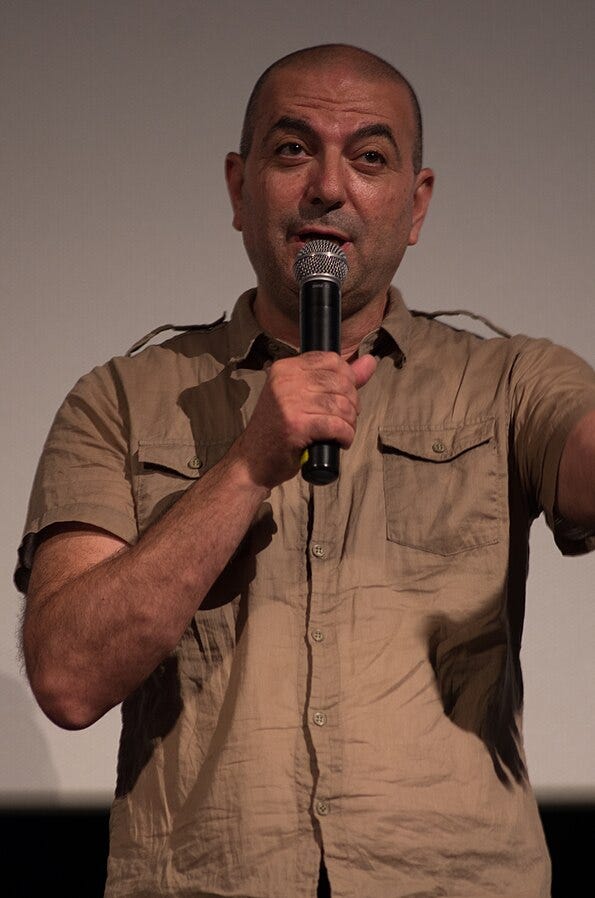
Born on 11 October 1961, Hany Abu-Assad is an Israeli-Dutch film director and screenwriter of Palestinian origin. He was born in the Palestinian-occupied city of Nazareth, and has forged ties within the Israeli borders as a Hebrew-speaker. He was inspired to pursue a career in cinema after watching a film directed by fellow Palestinian Michel Khleifi. He started off as a television producer for the BBC before founding the Ayloul Film Productions in 1990 with another Palestinian filmmaker, Rashid Masharawi.
As a filmmaker, Abu-Assad does not shy away from injecting his political opinions into his films. On the decades long Israel-Palestine conflict, he said:
“I’ve always been against colonization. I am human where I believe every human being is equal and there should be justice and rule of the law. I appreciate [Jews]. There are so many Jewish people speaking against Zionism. We have fighters and people who use violence, but in general Palestinians don’t like violence, which is why most of us are still watching from the sidelines as these horrible crimes against our people take place… With all these crimes, I still think there is a place for Jews but there is no place for occupation, discrimination, or apartheid. There is a place for the Jews, but there is no place for supremacy.”
In 2013, Omar was screened in the Un Certain Regard (‘A Certain Glance’) section at the Cannes Film Festival and won the Special Jury Prize (‘Prix Spécial du Jury’) — where film critic Dave Kehr noted, “is intended to recognise an original work that embodies the spirit of inquiry”. This is especially notable as the Un Certain Regard section highlights films with unusual styles and non-traditional stories that seek international recognition. Film academic Andrew M. Butler has also noted that jury prize is the Cannes’ way of helping a film to gain a distribution deal. Omar continued to win the Best Feature Film in the Asia Pacific Screen Awards, and had nominations in the categories: ‘Best Performance by an Actor’ and ‘Achievement in Cinematography’. In 2014, Omar was nominated for the Best Foreign Language Film at the 86th Oscar Academy Awards.
As of October 2024, Abu-Assad does not plan to return to directing. “[Palestinian cinema is] closed,” he said solemnly, before delving into an anecdote about his actor from The Idol (2015):
“[Qais Attaallah’s] entire family has been wiped out. He lost his grandparents, uncles, aunts, and their children. When the war started, they left Gaza City for a villa, thinking they would be safe. They had nothing to do with Hamas”.
Abu-Assad embraces the political elements and controversies that his films depict. As one of Palestine’s most successful filmmakers, he has faced numerous failed projects and professional tensions due to his outspoken nature. As a producer, he disagreed with Egyptian director Mohammed Diab on Amira as it mishandled the topic of conceiving children with smuggled sperm of Palestinian freedom fighters. The film was forced to drop out from its 2022 Oscar entry and the Red Sea Film Festival, where Abu-Assad affirmed that “the feelings of the Palestinian prisoners were above all”. Abu-Assad also left a $12M Netflix series deal for King’s Wives after making it too realistic to Arab monarchies and refusing to depoliticise it. Another project with TriStar Pictures to adapt the popular comic Infidel fell through.
Abu-Assad believes that he is simply doing what artists are supposed to do: to colour in the spaces between the black and white visions of politicians. His art is fuelled by his sense of struggle and oppression, and recognises that artists thrive under oppression.
“It’s important to tackle thorny or controversial topics, and if some people get angry, that’s okay. Making a movie that angers society isn’t necessarily a bad thing. If people decide not to interview me, or release the film, or ban the film, so be it… that’s not my motivation. I am against bans and taboos– that’s a sign of weakness. The stronger the society, the more accepting it is of controversy.”
– Hany Abu-Assad, El Gouna Film Festival 2024
Abu-Assad concludes that the film industry in the Middle East and North Africa should think of other ways to finance its productions, instead of relying on the West and risking a conflict against the mainstream Western narrative. Various streams of financing would allow curious filmmakers like Abu-Assad to challenge themselves and to make different types of movies. However, it is important to note that Omar is the first film to be (almost) funded by the Palestinian industry— a step toward independence.
The West Bank Barrier
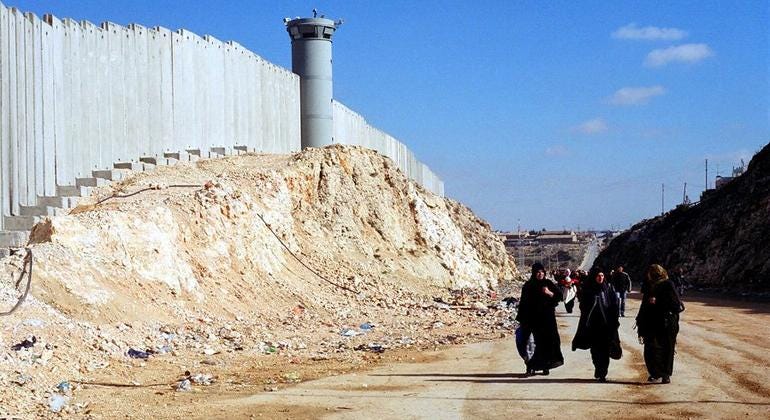
The West Bank is a territory of Palestine that is West of the Jordan River, and has been occupied by Israel since the Six Day War of 1967. Its name comes from being located along the west banks of the Jordan River and most of the Dead Sea. The borders and status of the area were established by the Jordanian-Israeli armistice of 1949, and afterwards Jordan, Israel and the Palestine Liberation Organisation each laid claim to the areas of the West Bank. The principal Palestinian regions in the West Bank are Jenin, Nablus, Ramallah and Bethlehem. After the Six Day War of 1967, Israel established military settlement camps (of which the United Nations considers as illegal under international law) and the issue has not been resolved since.
The separation barrier was built by Israel after the Second Intifada, which runs along the Green Link outlined by the the 1949 armistice and inside certain parts of the West Bank. Although Israel describes the wall as necessary for securing itself against Palestinian violence, Palestinians call it the ‘Wall of Apartheid’ as it represents racial segregation and Israeli apartheid.
The 9-metre-high wall barrier has always stood facing multiple Israeli checkpoints, and the number of these checkpoints have increased to 898 since the 2025 ceasefire. These checkpoints are military infrastructures permanently staffed by soldiers and border police who control movement across the region. They are also equipped with metal detectors, surveillance cameras, face recognition technology, and detention rooms for interrogation.
On one hand, this wall represents the looming threat over Palestinians. On the other hand, it protects the Israel Defence Forces who were given ‘overly permissive open-fire regulations’ as noted by the Human Rights Watch in 1990. In July 2024, Israeli soldiers revealed to +972 Magazine that during the 2023 genocide, they were allowed to:
“Shoot as they please and with all their might, especially at persons in IDF-declared no-go zones, without first trying to ascertain their status as civilian or combatant… There was total freedom of action. If there is [even] a feeling of threat, there is no need to explain— you just shoot. It’s permissible to shoot everyone, a young girl, an old woman.”
Only one soldier interviewed was willing to reveal his name. He spoke of November and December 2023:
“There were no restrictions on ammunition. People were shooting just to relieve the boredom. In the end you die of boredom, [after] days of waiting there. We destroyed everything we wanted to. This is not out of a desire to destroy, but out of a total indifference to everything [Palestinian].”
— Yuval Green, 55th Paratroopers Brigade
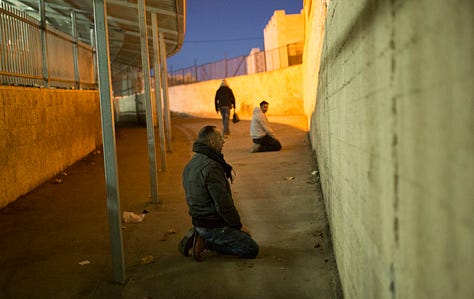
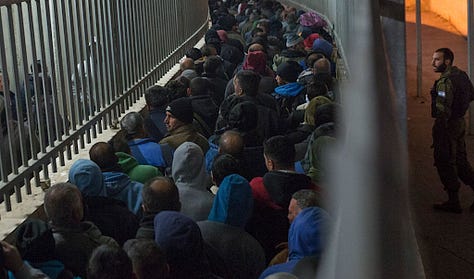
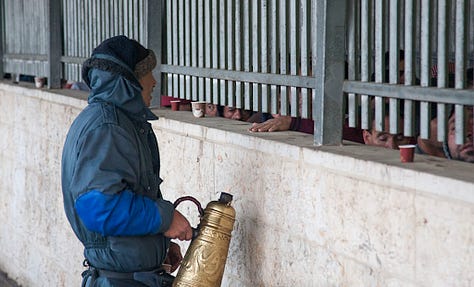
(The above pictures of Checkpoint 300 are from Al Jazeera, here.)
Prisons in Israel
The Israel Prison Service is the state agency responsible for overseeing prisons in Israel, and is under the jurisdiction of the Ministry of Public Security. Personnel are trained in krav maga (“contact combat”) and conduct training for the prison section for the Israeli Military Police. In the past, American Human Rights reports have framed their detention centres as well-lit, well-equipped with facilities and with ample space, noting that the prisons generally meet international standards. However, these standards were unmet during surprise inspections, as the living conditions were found unfit for human habitation, along with widespread cases of inmates’ rights violations. The Human Rights Watch in 1991 found that although still cruel, inmates were given basic necessities and the prisons were still governed by international norms.
The treatment of Palestinian prisoners in Israel became a widespread topic of scrutiny after the 2023 genocide began. A B’Tselem report interviewed recently released inmates and described how the treatment of Palestinian prisoners degraded into:
“Frequent acts of severe, arbitrary violence; sexual assault; humiliation and degradation; deliberate starvation; forced unhygienic conditions; sleep deprivation; prohibition on, and punitive measures for, religious worship; confiscation of all communal and personal belongings; and denial of adequate medical treatment… Violence is an ever-present part of daily life: every time a prisoner enters or exits the cell, and even before being released.”
— Welcome to Hell: The Israeli Prison System as a Network of Torture Camps
Even the Israeli journalist Gideon Levy commented in the Haaretz newspaper:
“Here, [torture is used] solely to satisfy the darkest and sickest sadistic urges.”
A possible reason for the recent, drastic decline in prison conditions is because after becoming the Minister of National Security in 2022, Itamar Ben Gvir instructed the Israel Prison Service to become harsher towards Palestinian prisoners— including denying them fresh pita/bread, washing, and water. Until his resignation on 19 January 2025, Ben Gvir was also responsible for refusing delegates of the International Committee of the Red Cross from entering the prisons. Since the 2023 genocide, no independent group has been able to monitor Israeli places of detention and to check if human rights standards have been adhered to. Despite this, there has been mass documentation on social media showing Palestinians who have died from mistreatment in Israeli prisons, including multiple Gazan physicians like Adnan al-Bursh and Iyad Rantisi.
Several Israeli human rights groups have petitioned the Israeli Supreme Court to order the closure of Sde Teiman, a military base in Negev that has taken in more than 4000 Gazan men. A doctor stationed at Sde Teiman wrote in a letter in March 2024:
“Just this week, two prisoners had their legs amputated due to handcuff injuries, which unfortunately is a routine event.”
Even when army police arrived in July 2024 to arrest nine Israeli soldiers who were suspected of severely injuring a Palestinian inmate by sodomising him with an object, a crowd of Israelis stormed Sde Teiman to protest this rare occasion of authorities attempting to hold soldiers accountable for abuse.
Alongside the use of escalated violence and movement restrictions, Palestinians believe that imprisonment is a crucial tool to facilitate Israel’s occupation— around 40% of Palestinian men have been arrested at least once in their lives. Many of them are charged as ‘unlawful combatants’ under emergency legislation, which allows indefinite detention without charge nor trial.
“Mass incarceration has always been part of the apartheid system by which Israeli authorities subjugate Palestinians.”
The Politics of Snitching
When Palestinians leave their houses, they are already considered as street criminals—they cannot rely on the police for protection and have great difficulty in staking a legitimate claim to be considered as a victim. They may feel extreme anxiety, paranoia, and feeling constantly watched by the Israeli police where one wrong move would lead to immediate consequences. As a result, there is an implicit ‘code of the street’ that substitutes for legal rules in the Israeli-occupied Palestinian territories, and ‘snitching’ where Palestinians give information to the Israeli police for a reward or reduced punishment.
Informants have historically played a key role in the Israeli-Palestinian conflict. A 1994 B’Tselem report noted that Israeli authorities have threatened and coerced tens of thousands of Palestinians to work as informants since 1967 for information on Hamas or political activists. Israeli officials may even threaten to expose queer Palestinians’ sexual identities and subject them to social ostracisation. Palestinians may pass information to escape the oppressive environment surrounding Palestine, and to obtain an Israeli work permit, access better medical treatment, and citizenship.
One method of recruiting informants is by shutting down the Rafah crossing and funnelling Palestinians through Erez so that Israeli officers can pressure and tempt them. A modern method is to use social media— with the highest Gazan unemployment rate since 2009, offering money can tempt the naive Palestinian youth who are unaware about their collaboration. Demonstrated in Abu-Assad’s Omar (2013) and as seen in real life, many informants pretend to be real prisoners and fool Palestinian detainees to reveal information that Israeli intelligence cannot get. Former Israeli intelligence officer Chaim Nativ said:
“Sometimes when you are stuck in the interrogation, the case is on the border. You don’t know if he’s white or black. So you send him to the asafeer.”
Asafeer ( عصافير) means ‘sparrow’ in Arabic, and is slang for informants because they mimic the methods that Palestinians use to organise themselves. The technique takes advantage of the prisoner’s emotional needs because it is lonely while being in custody. An Israeli prison officer may put a Palestinian prisoner in a solitary cell and starve them for days, before moving them to a cell full of welcoming sparrows. This tactic is most effective on inexperienced prisoners.
Translation: If you wish a better future for you and your children, take action and give us solid and beneficial information regarding the captives in your area at once. The Israeli Army promises to invest maximal effort to provide security for your family and a monetary reward. We promise complete confidentiality. Israel Defense Forces.
However, Palestine does not look kindly on those trading intelligence with Israel. Under the Palestine Liberation Organisation’s Revolutionary Penal Code 1979, Article 9 stipulates that a person can receive the death penalty for acting against the security, safety and interests of the revolution troops. In 2014, eighteen informants were publicly executed with beige sacks over their heads and awaited capital punishment from Palestinian fighters.
In 2018, a Gazan family killed their own member for collaborating with Israel which allegedly led to the deaths of three Hamas militants. In January 2024, the Tulkarm Brigade (Palestinian militia group) executed a Palestinian informant after he allegedly gave information about their fighters, resulting in four deaths. Between the Israeli threat of oppression and the Palestinian society’s capital punishment, an individual living in the occupied territories is faced with an impossible choice. Israeli authorities effectively create an atmosphere of distrust between the networks of Palestinian communities.
“Israel’s objective in the occupied Palestinian territory is control, domination, and subjugation… to instil fear in Palestinians, preventing them from acting or socializing naturally.”
— former high-ranking officer in Unit 8200, Israeli intelligence service
Before Benjamin Netanyahu got re-elected with his far-right parties in 2022, ‘Operation Room C’ was set up for ordinary citizens to report on any unauthorised construction in Area C of the occupied West Bank. Its portal is exclusively in Hebrew to create a language barrier against Palestinians. Despite being presented as open to all residents, the line is only used by Israeli settlers to effectively target Palestinian construction. Digging for water wells, repair work and even planting trees were forbidden, forcing many Palestinians out of their land. As Area C accounts for around 61% of the West Bank, this advances Israel’s ultimate colonial goal of annexing Palestinian territories.
Thanks for reading our post reviewing the film, Omar (2013) directed by Hany Abu-Assad! All opinions stated in our review are held by Narratives of Resistance only— it does not represent the views of anyone else. If you watch the film, leave a comment below or DM us for a chat! Please check out the hyperlinks if you want to read more about Hany Abu-Assad, the West Bank wall, prisons in Israel, and the historical context behind snitching.
If you want to stay updated with our art and cultural engagements, subscribe to our Substack and follow us on Instagram @nor.films — we post event announcements, share charities, and other helpful resources to stay critically educated on resistance art.








Noice.
Great read!